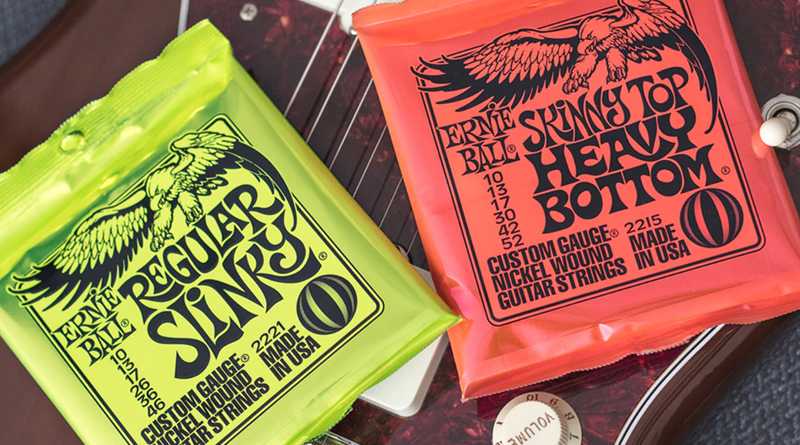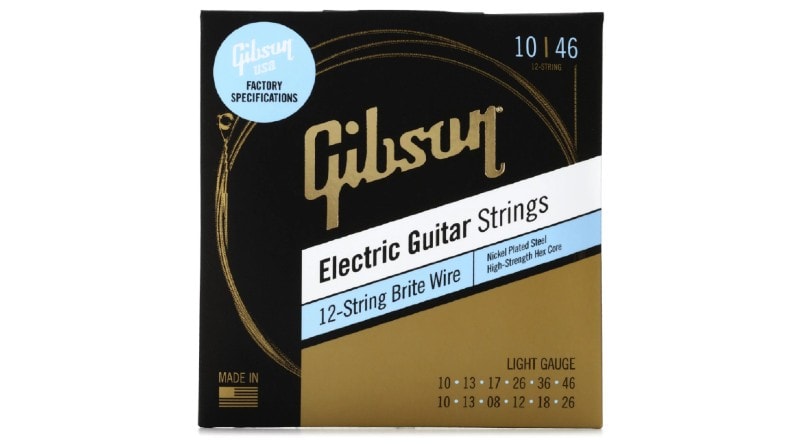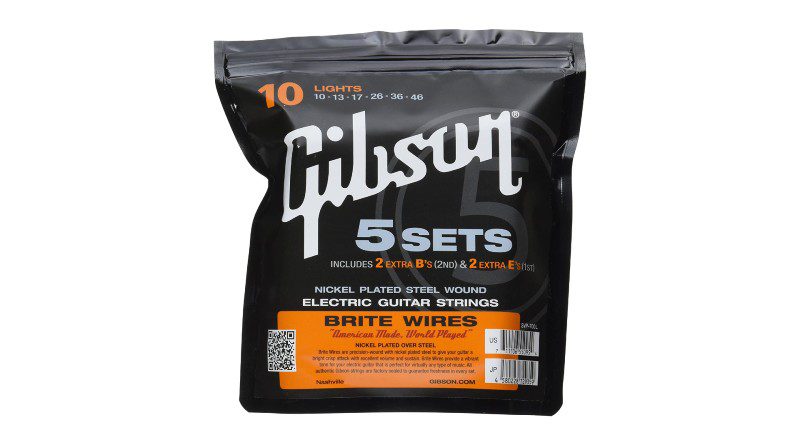Internet rumors being what they are, there are a wide range of opinions on the strings that come ready to go when you buy a new Epiphone Les Paul. On message boards and Facebook groups, people will tell you they’re D’Addario, Ernie Ball, no-brand junk, and anything in between.
However, in an email to KillerGuitarRigs, an Epiphone rep confirmed that the strings that come on all Epiphone electric models are Gibson Britewire strings in 10-46 gauge. He also confirmed that all Epiphone acoustic models ship with 12-53 gauge Gibson Masterbuilt Phosphor Bronze.
So if you broke a string on your new Les Paul or if it’s starting to sound dull, you can pick up the exact same electric strings at Sweetwater for around $10, or if you’re playing acoustic, Sweetwater carries what you’re looking for too (and we have a comprehensive list of the best acoustic guitar strings if you need other suggestions).
On the other hand, if you’re looking for something a little different, there’s a whole world of strings out there. People tend to try a lot of strings, find the brand and gauge that works for them, and then stick with it for years. In this article, we’re going to walk you through your options.
Read more about our review process.
Contents
How To Choose Guitar Strings

There are a lot of aspects of playing guitar that can be stopping points. If you’re a Les Paul guy (be it Studio, Standard, or Custom), it will take you some time to get used to a guitar with a longer neck, like a Fender Strat. If you use a Boss HM2 to get your distortion tones, you’ll need time with a Fender Pugilist to find your sound (if you ever do).
However, there are very few guitarists who will pick up a guitar strung with Ernie Balls in whatever gauge they normally play and think, “I can’t play this thing – I’m a D’addario player!”
The good thing about that is that, in your journey to finding the strings that work best for how you play and want to sound, you’re incredibly unlikely to find a set you just can’t stand to play. Typically, you’ll load ’em up, play them for a few weeks, and then try another.
So, when you’re playing your current guitar, think about a few things (and check out our full guitar string guide).
String Gauge

When people talk about strings, they usually talk in terms of the thinnest strings. For example, when people say they play 9s – that usually means they play a .009 – .042 gauge set.
In a nutshell, thicker strings are going to give you more bass, and thinner strings are going to give you more treble.
Some of the things to think about as far as thinner strings are that they will be easier to bend and, in a ballpark sense, be easier to play as far as legato and other shredder techniques. For beginners, thinner strings can be great as they make your learning curve that much flatter and you won’t end up fighting with the guitar so much.
On the other hand, if you’re a metal player, thinner strings aren’t going to give you that chunky riff sound on the lower notes, and if you’re tuning your guitar down, they’re going to feel like a bunch of flapping wires on your guitar. In these situations, you’ll want to go with thicker strings for rock and metal players.
You can get hybrid sets where the lower strings are thicker and the higher strings are lighter, but for a new player, it’s best to think about which you want and then move forward.
String Material

The vast majority of guitar strings you will come across will be steel strings, where the thickest strings are wound in nickel. The steel strings will be brighter, whereas the nickel wound ones are a little darker but hold lower notes much better. In addition, your nickel strings will have a richer tone – you can see this by playing the sixth fret on your fourth string and comparing it with the sound of the first fret on your third string – same notes, very different sound.
Some strings come with additional coatings that provide a variety of different tones – here are some of the typical ones:
- Nickel-plated steel: great balance between bright and warm
- Pure Nickel: less bright than nickel-plated strings but with a warm boost
- Stainless Steel – much brighter, no finger squeaking
- Titanium – very strong strings, very bright
- Chrome – less resonant but very warm – popular with jazz and blues players
Best Strings For Epiphone Les Paul

If you’re looking for the exact same strings that came on your guitar, Sweetwater sells the Gibson Britewires that are already on there. However, if you want to try something different – the world is your oyster.
If you’re looking for something a little darker – for jazz or blues players – D’addario makes a set called the ECG24 set for you. They’re a specially made flatwound stainless steel set that ribbon wound to give you a smooth feel and rich dark tone that jazz players go for. For more blues suggestions, check out our picks for the best blues strings.
On the other hand, if you want to shred, Ernie Ball’s Super Slinky strings are the standard for most guitarists. Nickel wound and fast as all get out, a set in the 9-24 gauge will have you shredding with the best.
If your plan is to tune your guitar down for metal or doom, check out Ernie Ball’s Mammoth Slinky strings. These 12-42 gauge strings are optimized for low tunings, and even on the shorter scale neck of a Les Paul can stand getting all the way down to drop A or C standard without blinking.
If your preference is for a set of strings that will sound new as long as possible and rarely break, check out Ernie Ball’s Paradigm series (available in a variety of gauges including 7-string) or my personal favorite, D’addario’s nickel-plated NYXL strings. They’re the only strings I use because they sound great, and those things never break.
Want to try out a bunch of different coatings to see what you like? Ernie Ball does these cool variety packs that are actually not all that expensive and give you a choice of the regular nickel wound slinky strings, a set of their cobalt strings, and a set of their M-Steel (short for Maraging Steel) strings, which are ultra high output and sound killer.
Final Thoughts on Epiphone Les Paul Strings
Guitar strings can be a thing you have a ton of fun with, or they can be a thing you never think about. Some people go with whatever the guy gives them at the store when they say, “give me a set of nines”, while some people change their strings once a week to find the ultimate string.
Have fun with it, get a few packs, figure out what helps you hit your tone and playing goals, and then move on to the fun stuff – playing the thing!


